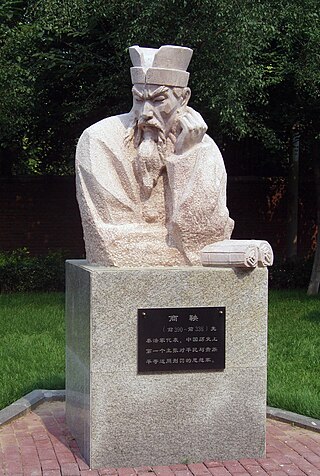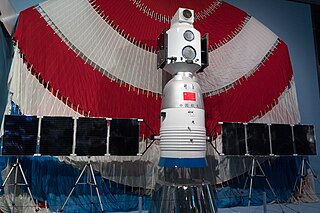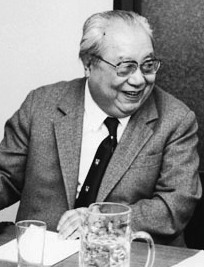 | |
| Personal information | |
|---|---|
| Nationality | Chinese |
| Born | 12 March 2003 Hangzhou, China |
| Sport | |
| Sport | Swimming |
Fei Liwei (born 12 March 2003) [1] is a Chinese competitive swimmer. He represented China at the 2024 Summer Olympics.
 | |
| Personal information | |
|---|---|
| Nationality | Chinese |
| Born | 12 March 2003 Hangzhou, China |
| Sport | |
| Sport | Swimming |
Fei Liwei (born 12 March 2003) [1] is a Chinese competitive swimmer. He represented China at the 2024 Summer Olympics.
Year 277 (CCLXXVII) was a common year starting on Monday of the Julian calendar. At the time, it was known as the Year of the Consulship of Probus and Paulinus. The denomination 277 for this year has been used since the early medieval period, when the Anno Domini calendar era became the prevalent method in Europe for naming years.

Fajia, or the School of fa, often translated as Legalism, is a school of mainly Warring States period classical Chinese philosophy whose ideas variously contributed to the formation of the bureaucratic Chinese empire, and early elements of Daoism. The later Han takes Guan Zhong as a forefather of the Fajia. Its more Legalistic figures include ministers Li Kui and Shang Yang, and more Daoistic figures Shen Buhai and philosopher Shen Dao, with the late Han Feizi drawing on both. As written by Sima Qian, later centuries associated Xun Kuang as a teacher of Han Fei and Li Si. The Qin to Tang were more characterized by its traditions, often characterized in the West along realist lines.

Yang Liwei is a Chinese major general, former military pilot, and former taikonaut of the People's Liberation Army.

Shenzhou 5 was the first human spaceflight mission of the Chinese space program, launched on 15 October 2003. The Shenzhou spacecraft was launched on a Long March 2F launch vehicle. There had been four previous flights of uncrewed Shenzhou missions since 1999. China became the third country in the world to have independent human spaceflight capability after the Soviet Union and the United States.

Fei Xiaotong or Fei Hsiao-tung was a Chinese anthropologist and sociologist. He was a pioneering researcher and professor of sociology and anthropology; he was also noted for his studies in the study of China's ethnic groups as well as a social activist. Starting in the late 1930s, he and his colleagues established Chinese sociology and his works were instrumental in laying a foundation for the development of sociological and anthropological studies in China, as well as in introducing social and cultural phenomena of China to the international community. His last post before his death in 2005 was as Professor of Sociology at Peking University.
Cheng Fei is a Chinese retired artistic gymnast. She is a three-time World Champion on the vault (2005–2007) and 2006 World Champion on floor exercise. She was a member of the gold medal-winning Chinese teams for the 2006 World Artistic Gymnastics Championships in Aarhus, Denmark and 2008 Olympic Games in Beijing, China. She was also a member of the silver medal-winning Chinese team for the 2007 World Artistic Gymnastics Championships in Stuttgart, Germany.

Zhai Zhigang is a Chinese major general of the People's Liberation Army Strategic Support Force (PLASSF) in active service as a People's Liberation Army Astronaut Corps (PLAAC) taikonaut. During the Shenzhou 7 mission in 2008, he became the first Chinese citizen to carry out a spacewalk. He was a People's Liberation Army Air Force (PLAAF) fighter pilot.

Nie Haisheng is a major general of the Chinese People's Liberation Army Strategic Support Force (PLASSF) in active service as an taikonaut and the third commander of the PLA Astronaut Corps (PLAAC). He was a PLA Air Force fighter pilot and director of navigation.

Kowloon Peak, also known as Fei Ngo Shan, is a 1,975-foot-tall (602 m) mountain in the northeast corner of New Kowloon, Hong Kong, situated in Ma On Shan Country Park. With the summit located just to the east of the border between Wong Tai Sin and Sai Kung districts, it is the tallest mountain in Kowloon, and is crossed by both the Wilson Trail and the MacLehose Trail.
Tuoba Liwei was the first leader of the Tuoba clan of the Xianbei people, in 219–277. He was the ancestor of the future Northern Wei Dynasty and was thus posthumously honored as Emperor Shenyuan, with the temple name Shizu. Later, Emperor Wen of Western Wei changed his temple name to Taizu.
Li Wei or Wei Li may refer to:
Herbert Feis was an American historian, author, and economist who was the Advisor on International Economic Affairs in the US Department of State during the Herbert Hoover and Franklin Roosevelt administrations.
China Manned Space Agency is a government agency of the People's Republic of China responsible for the administration of China Manned Space Program, the Chinese human spaceflight program. The agency is under the Equipment Development Department of the Central Military Commission.
Yang Liwei is a Chinese basketball player for Inner Mongolia women's basketball team and the Chinese national team, where she participated at the 2014 FIBA World Championship.

The People's Liberation Army Air Force Aviation University is a military university in Changchun, Jilin, China.
Shinho is a Chinese food manufacturer. Its products include soy sauce, rice vinegar, and a range of classic Chinese condiments, in addition to peanut-based packaged snacks.
Goh Sze Fei is a Malaysian badminton player. He was a silver medalist in the 2024 Asian Championships. Goh was part of the Malaysia winning team in the 2022 Asia Team Championships. He won the 2022 German Open in the men's doubles event partnered with Nur Izzuddin, their first BWF World Tour title.

The People's Liberation Army Astronaut Corps, also known as the Chinese Astronaut Corps, is a Beijing-based deputy-corps grade People's Liberation Army Aerospace Force (PLAASF) and is responsible for the selection and training of the astronaut corps for Project 921, the Chinese manned space program.

A blessing in disguise is an English language idiom referring to the idea that something that appears to be a misfortune can have unexpected benefits. It first appeared in James Hervey's hymn "Since all the downward tracts of time" in 1746, and is in current use in everyday speech and as the title of creative works such as novels, songs and poetry.